- Home
- Allison Brennan
The Third to Die Page 3
The Third to Die Read online
Page 3
“Catherine, just this one.”
That angered her even more. It was his tone—as if he knew if she took just this one case that she’d be back for good.
“What can I say to you?” she said. “You think I blame myself for Beth’s death? I do—and I blame you. I was a fool to believe for a minute that you had changed, that you could care about anyone but yourself. I thought because my sister was beautiful and funny and smart that you would love her like I did, but you’re incapable. You broke her heart, Matt—and I should have warned her. Leopards don’t change their spots, do they?”
Matt mumbled under his breath in Spanish, which he often did when angry or thinking. “Eres imposible. No sabes cuándo parar.”
She was impossible? She didn’t know how to stop?
He rose from the chair, fists clenched. She almost wanted him to hit her. The physical pain might numb the ache inside her that would never fade.
He was angry, yes, but she saw his pain, too, as clear as day. She’d spoken to hurt him, because he had burst through her carefully built wall. Her words had cut deep. She wished she could take them back. Matt had once been her only true friend. Everyone loved Chris, because he was that kind of guy. She and Chris had friends because of him, not her. She didn’t know how to communicate with people in any depth. She didn’t want to. Everything seemed so...fake, superficial. Almost unreal, as if she were watching every interaction from above.
Matt understood her, they’d trained together, they’d worked cases together, and best, Chris respected their friendship. It had been Chris’s idea to ask Matt to be their daughter Elizabeth’s godfather. And now Matt and Chris were still close and she was on the periphery again. As she had been her entire life. Trapped by her own personality, by her isolation. Watching the world turn without her.
“You wrote the profile on the Triple Killer, Catherine. I need you on this case. I will be sending you an update when I get to Spokane, as soon as I get something from the locals. I’ll send you the autopsy report, victimology, photos.”
She didn’t say anything.
“I want you as part of this team for many reasons. First, you’re the best. Second, I don’t believe you can put your successful career aside and go into private practice to help people quit smoking or forgive their parents for being cold bastards. But mostly, because I know you want to be home with Chris and Lizzy. But you can’t be there all the time—it’s as if the good in your life is too good and you have to immerse yourself in the dark in order to enjoy the light. This job will give you exactly what you need.”
Matt walked to the door, but he didn’t leave.
Please go, Matt.
But she just stared at his back, because she knew he was right. And she was sorry she’d hurt him.
“You don’t even have to come out to the West Coast, Catherine,” he said quietly, “but I need you. The victims need you. This killer isn’t going to stop. He’s going to kill again, and if you don’t help me stop him, he’s going to get away with it.” Matt turned and looked at her. The anger was gone, and all that remained was sorrow.
Apologize, Catherine. Tell him you didn’t mean it.
She sensed he wanted to say something more, and she found herself wanting to know what it was—because this was one of those rare moments that she couldn’t predict what someone was thinking. What someone was going to say.
Matt didn’t say anything.
Instead, he walked out.
And just like that, Catherine realized she may have lost her only real friend in the entire world.
Isn’t that what you wanted?
Maybe in that moment, but not anymore.
Catherine felt lost, torn over her career, her marriage, her friendships.
But the one thing she wasn’t confused about was her vocation.
She knew she could get into the mind of the Triple Killer and find out what made him tick. And if she did so, she would be able to give Matt what he needed to stop a brutal killer.
And maybe, just maybe, she could prevent another family from suffering like she suffered.
5
Thursday, March 4
Liberty Lake
7:45 a.m.
Matt stared down at the lake near the spot where the victim met her violent end. She had been identified as Victoria Manners, a nurse from Spokane.
It was a cold but clear morning—exactly as it had been the day before. According to the Liberty Lake detective in charge of the murder investigation—and the only detective in their small police department—he’d called for the Spokane crime scene investigators to collect and process evidence. They had transported the body to the Spokane morgue, and Matt planned to view the autopsy and talk to their ME at nine this morning.
But he wanted to walk the crime scene first, to give himself some grounding and a place to start. At least, to start on this case—he was already well versed in the previous victims of this serial killer. He’d read those files on the plane flying out here last night, including Catherine’s preliminary profile.
There was no doubt in his mind that Catherine would be working the case; he’d pushed their argument out of his head. He’d deal with Catherine’s guilt later; for now he had a killer to stop.
He looked around the area, getting a sense of how it might have appeared at night. Dark—there had been minimal moonlight on March 3. Why had the killer picked this spot? Not just Liberty Lake—though that might be as important to the killer as Portland and Missoula were in the first two sets of murders—but why had he picked this exact spot to kill Victoria Manners? Convenience? Privacy? Did it hold a special meaning for him?
Matt took a few pictures on his cell phone, even though Detective Knolls was putting together a complete file for him. Just being here, in the middle of the woods next to a gorgeous lake—hell, just being outdoors—made Matt happier than he’d been since he’d been forced into that tiny office at DC headquarters. He thrived in the field. And this case—if his new team could identify and arrest the killer—would give the MRT major points among their detractors at HQ who thought the creation of such a team was a waste of resources. Matt needed a win—but he needed a solid win, fast.
Victoria Manners was the seventh known victim of the Triple Killer, though it wasn’t until after the fifth victim three years ago—almost to the day—that law enforcement had made the connection. Then the bastard gutted an off-duty cop and slipped away. Disappeared for three years.
Because of the pattern, the FBI had sent a warning in advance to all law enforcement agencies to be on the lookout for any victim who might have been similarly mutilated on or around March 3 of this year.
Although they were unable to prevent her murder, they were extremely lucky that Victoria Manners’s body was discovered so quickly. But it was experience, skill, and a competent local police department—not luck—that landed Matt Costa here just twenty-four hours after the body was found. Because of that, they had a real chance to catch the killer before he took his next victim. But because his victims appeared to be selected randomly and within a small window of time, Matt knew his team was on a very tight clock.
The tracks that the killer had left when he—and they assumed it was a “he” because of Catherine’s profile—drove an ATV from the wide running path to the water’s edge were still partly visible in the slush. There’d been no fresh snow recently, and while the mountaintops were still pristine and white, most of the town was dealing with remnants of the last storm. According to the local authorities, they’d been able to take good impressions of the tire treads. Matt already asked them to ship the impressions to the FBI lab if they didn’t have the capability to process them quickly. Once his mobile crime unit was fully staffed and operational, they wouldn’t have to rely on local labs or the national lab for results. Until then he would use any facility at his disposal.
Matt continued to take his
own pictures, starting from where the tracks deviated from the trail. He couldn’t yet see from here the exact place where Manners’s body had been found—it was downslope about fifty feet. What had the witness seen from here that caused her to investigate?
He walked downhill parallel to the tracks until he reached where they’d stopped. Obviously the body was gone. The crime scene investigators had collected samples of soil and other potential trace evidence, but they hadn’t found anything obviously connected to the killer. According to Detective Knolls, Manners was registered with a temp agency that specialized in health care staffing. She was in the middle of the third week of a six-week nursing assignment in the trauma ward of a Spokane hospital. Her shift ended at 8:00 p.m. on Tuesday, March 2. She’d clocked out at 8:09 p.m. No one reported her missing. She was 28, single, no known boyfriend. Her hospital ID was in the pocket of her scrubs, which was how they’d identified her, though Knolls also said they’d confirmed the ID through her prints.
Manners had never made it home that night—at least, her car wasn’t at the small duplex she rented downtown, near Gonzaga University. Her car also wasn’t at the hospital, and Detective Knolls had issued a BOLO for the vehicle.
If they were dealing with the same serial killer, even if they found the car, it would most likely yield no evidence. He was a wily bastard, smart and sick, who had never been seen with any of his previous victims. Four women, three men. Three under thirty-five, four over thirty-five. Caucasian woman, a stay-at-home-mother of three. Caucasian woman, a high school vice principal. A Japanese-American cop. Those three were killed in Portland, Oregon. But the cop was off duty and the killer may not have known he was a cop.
Catherine thought he knew; she’d said as much in her preliminary report. But did it mean something?
The next three didn’t fit a pattern, either—other than the last victim was a cop. An Asian nurse. A black college professor. A Caucasian cop. They were killed in Missoula, Montana.
And Victoria Manners, Caucasian female nurse, the first—and hopefully the only—victim in Liberty Lake, Washington. Three different cities now, with no obvious link among any of the victims.
Matt needed more coffee and a good two hours to process the details from the crime scene and reread Catherine’s report carefully.
A sound distracted Matt. He gazed back up toward the trail. Since a jogger had discovered the body, he wouldn’t be surprised if he encountered one or more this morning on the path. He could barely see the trail from his vantage point. Still, he didn’t see anyone.
He walked slowly back up the slope. The last thing he wanted to deal with was the press. If a photographer was out here trying to document the crime scene for some lurid report, Matt would go ballistic. Internally, at least. He was exceptionally good at controlling his temper. He’d learned the hard way.
Matt sensed he was being watched. Killers, on occasion, returned to the scene of the crime.
He had his hand on the butt of his Glock.
When he reached the top of the slope, he saw a petite blonde in black skintight jogging pants with a bright green stripe down the side and a matching Dri-Fit jacket. She wore a fanny pack and was drinking water from a neoprene bottle. She looked right at him. He adjusted his hand so she didn’t see his gun. No use scaring the locals, though this was the West and rural communities generally had their fair share of gun owners.
“Hope I didn’t startle you,” Matt said. She was the first person he’d seen on the trail.
“You didn’t. Andy said he’d called in the feds, figured you’d all be sniffing around, so I thought I would check out the situation.”
“You on the job?” Local police, he figured. Most civilians didn’t call FBI agents “the feds.”
“Kara Quinn, LAPD.”
Quinn. That was the name of the witness. She looked barely old enough to drink. Rookie cop stumbles across his DB?
“Matt Costa, SAC of the Mobile Response Team.”
She raised an eyebrow. “Special Agent in Charge? In the field? Never seen that before. Every ASAC and SAC I’ve met is a dick. Boys and girls both.”
He didn’t know how to respond to that. “LA as in Los Angeles?”
“Yep.”
“You’re a long way from home.”
“Cliché.”
“Vacation?”
“Of sorts.”
Why wasn’t she giving him straight answers? “You found the body.”
“I did.”
He glanced at his watch. He still had an hour before the autopsy; he could spare another fifteen minutes before heading back to his car.
“I planned to talk to you after the autopsy. But since you’re here—” odd, he thought, but didn’t ask her about it “—could you walk me through it?”
“I stopped back there—” she gestured down the trail “—to stretch at the four-mile marker. Started off again, and when I rounded the corner saw the ATV tracks going off toward the lake. At first I didn’t think much about it, but when I glanced down the slope I saw something odd—a hint of color. Neon.”
“And then?”
“I followed the tracks. The neon was the pink stethoscope around the victim’s neck. It was clear she’d been murdered—cut open, bled out there.”
“You could tell that with a look?”
“There was a fucking lot of blood.”
“You didn’t touch anything?”
“It was obvious she was long dead, I figured four to twelve hours. I didn’t need to check for her vitals.” She was assessing him, and there was a slight shift in her posture and demeanor. So subtle that if he wasn’t a trained interrogator, he wouldn’t have caught it.
“Based on the visual evidence,” Quinn said, “it appeared that the killer brought the victim to this location. No sign of a struggle or attempt to escape—the environment at the time was undisturbed, unlike now that the crime techs and police have gone over it. She was likely unconscious or drugged to the point of compliance. He laid her down, head toward the lake—Why? A ritual? Convenience?—and then sliced her from sternum to navel.”
Quinn’s tone had definitely shifted, from borderline playful to no-nonsense cop.
“How could you possibly know that?”
“Did you look at the crime scene photos?”
He’d glanced at them, but he hadn’t analyzed them. “Briefly.”
“It might not be obvious unless you enhance them,” she said, “but based on the killer’s footprints—not so much prints as impressions because the ground is rocky underneath the slush—he stood over her body, one foot on either side of her thighs. He’s right-handed—he sliced down, pulled the knife out, and stood above her. There was a significant pool of blood on the right side, where it likely dripped from the knife as he watched her die. Well, that was my sense when I saw it. I could be wrong.”
She spoke as if she knew she wasn’t wrong.
“Then, whether because the victim wasn’t completely dead or he had a compulsive need or was in a rage, he cut her from left to right three or four more times—there was significant blood spatter on the leaves and foliage to the right of the body. He didn’t specifically gut his victim—didn’t take out the organs, unless something’s missing when they autopsy her—but he certainly enjoyed the mess he made.” She paused a moment, then added, “He wasn’t in a rage. A rage would be multiple stab wounds, not a few slashes. At least, that’s my educated guess.”
She pointed north. “The killer left a different way than he came—he rode along the lake as far as he could until the terrain forced him back up to the trail. I told Andy—Detective Knolls. He’s the only detective in Liberty Lake, by the way. Good cop if you like your t’s crossed and your i’s dotted, if you want to find a thief robbing vacation houses on the lake or locate a serial rapist. But not so much a homicide cop. Anyway, I told him the killer cleaned u
p in the lake. I can’t prove it, just my gut. And the evidence supports it. The killer walked about fifteen feet from the body—away from her, but where he could still see her. There were many footprints between where the ATV was parked and the edge of the lake. Both with shoes and barefoot. Andy said the water was too cold for a dip, but I think that’s part of the ritual. Were the other bodies found near water?”
“No.” He hesitated, then decided to share a bit with this cop. Because she was more astute than most rookies he’d worked with, and definitely better than the average witness. “This is the fourth victim out of seven who was found outdoors. Only one of the previous victims was found near water—next to the Columbia River, in Portland.”
“I’m surprised I didn’t hear about these murders.”
“Missoula was three years ago this month, Portland six years ago.”
She looked up, as if thinking, then nodded. “I was deep cover.”
“You’re an undercover cop?”
“Detective.”
“Detective?”
“Am I not speaking clearly?”
“Sorry.”
She smiled, but didn’t answer his unspoken questions—how long had she been a cop, what kind of undercover work, did she have homicide training. If she was a detective, she had to be older than he initially thought. She knew he wanted those answers. Was she going to make him ask?
He didn’t. He’d find out on his own.
“Maybe not a ritual, but a convenience,” Quinn said. “Seven victims?”
“That we know about.”
“You think there’s more?”
“I’m not ruling it out.”
“When did the feds get involved?”
He hesitated. This was the kind of information they kept in-house, though Quinn was a cop. Even if she was on vacation.
Quinn said, “Do you want to see my badge?”
He almost said yes, then didn’t. There was nothing he was telling her that couldn’t be found through other channels. “Three years ago—but the killer’s been on a hiatus, of sorts. Now that he’s active again, we’re using every resource at our disposal to stop him.”

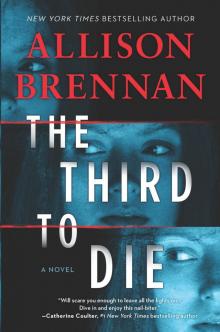 The Third to Die
The Third to Die Nothing to Hide
Nothing to Hide No Way Out
No Way Out Cold as Ice
Cold as Ice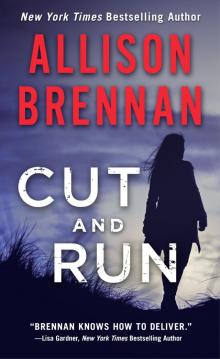 Cut and Run
Cut and Run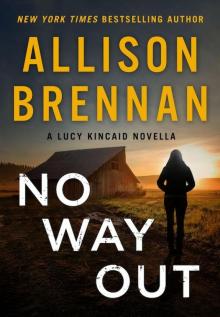 No Way Out (Lucy Kincaid Novels)
No Way Out (Lucy Kincaid Novels) Storm Warning
Storm Warning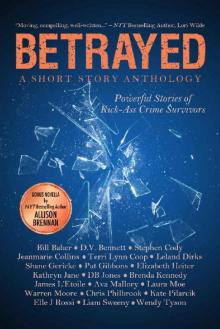 Betrayed: Powerful Stories of Kick-Ass Crime Survivors
Betrayed: Powerful Stories of Kick-Ass Crime Survivors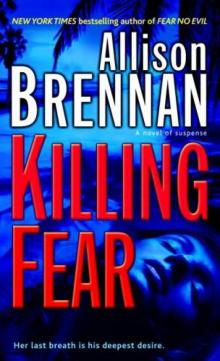 Killing Fear pb-1
Killing Fear pb-1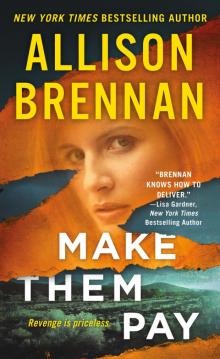 Make Them Pay
Make Them Pay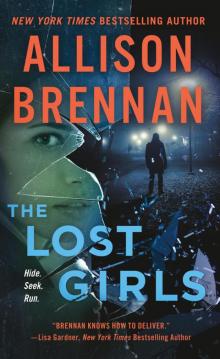 The Lost Girls
The Lost Girls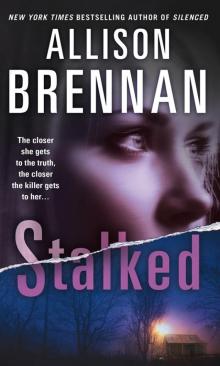 Stalked
Stalked Killing Justice
Killing Justice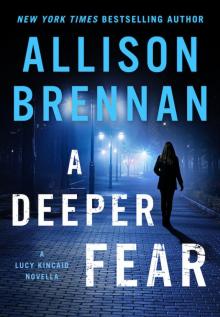 A Deeper Fear
A Deeper Fear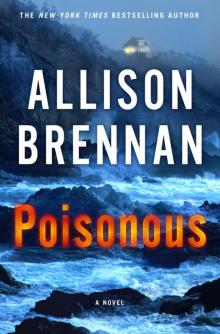 Poisonous
Poisonous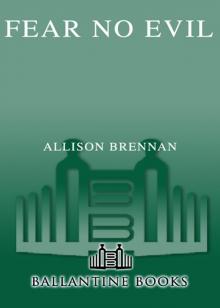 Fear No Evil
Fear No Evil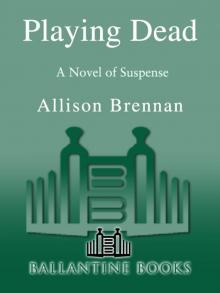 Playing Dead
Playing Dead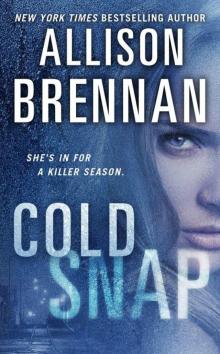 Cold Snap
Cold Snap Vacation Interrupted
Vacation Interrupted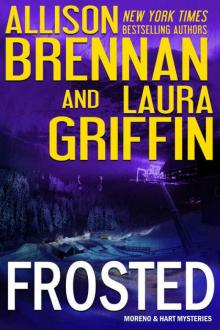 Frosted (Moreno & Hart Mysteries)
Frosted (Moreno & Hart Mysteries)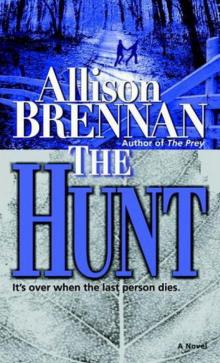 2 - The Hunt
2 - The Hunt Stolen
Stolen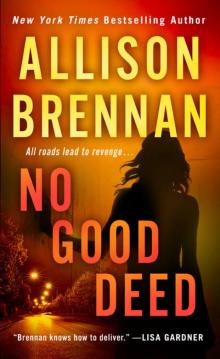 No Good Deed
No Good Deed Cutting Edge
Cutting Edge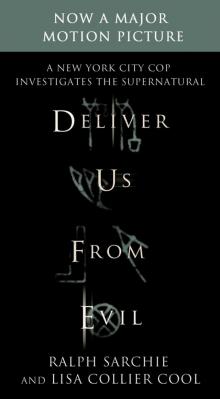 Deliver Us from Evil
Deliver Us from Evil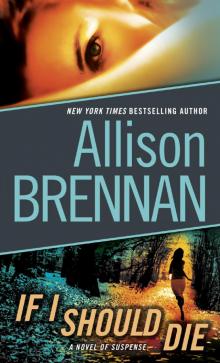 If I Should Die
If I Should Die Speak No Evil
Speak No Evil Silenced lk-4
Silenced lk-4 Original Sin sds-1
Original Sin sds-1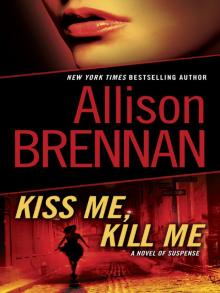 Kiss Me, Kill Me lk-2
Kiss Me, Kill Me lk-2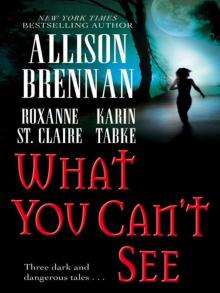 What You Can’t See
What You Can’t See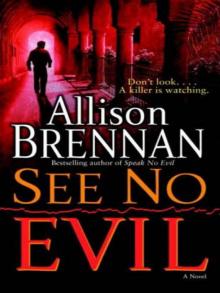 See No Evil
See No Evil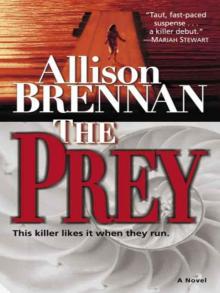 The Prey
The Prey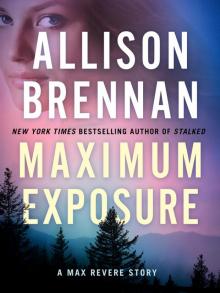 Maximum Exposure
Maximum Exposure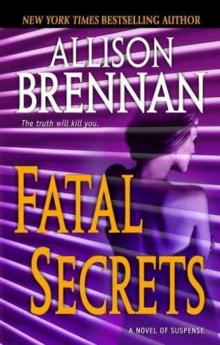 Fatal Secrets f-2
Fatal Secrets f-2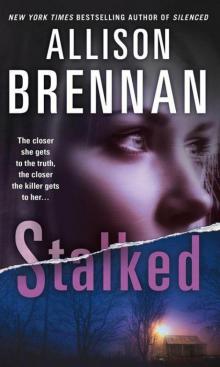 Stalked lk-5
Stalked lk-5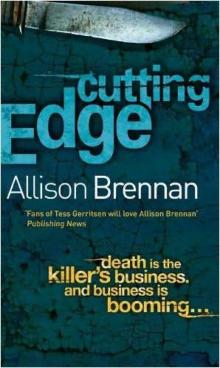 Cutting Edge f-3
Cutting Edge f-3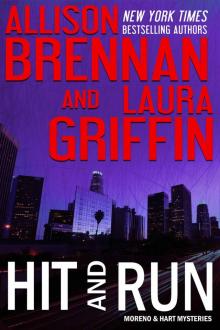 Hit and Run (Moreno & Hart Mysteries)
Hit and Run (Moreno & Hart Mysteries)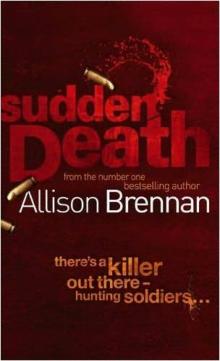 Sudden Death f-1
Sudden Death f-1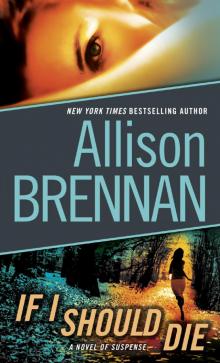 If I Should Die lk-3
If I Should Die lk-3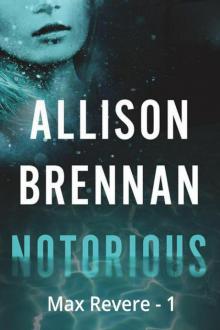 Notorious
Notorious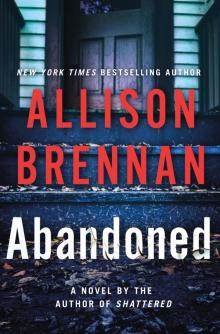 Abandoned
Abandoned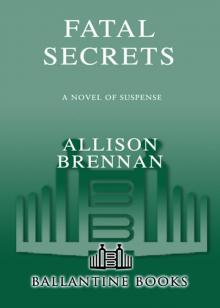 Fatal Secrets
Fatal Secrets The Hunt
The Hunt Carnal Sin sds-2
Carnal Sin sds-2 Love Is Murder
Love Is Murder Lost and Found
Lost and Found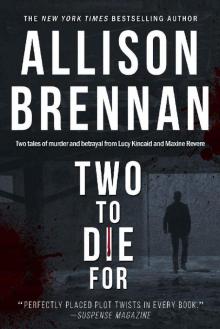 TWO TO DIE FOR
TWO TO DIE FOR Breaking Point
Breaking Point Best Laid Plans
Best Laid Plans Carnal Sin
Carnal Sin Silenced
Silenced Dead Heat
Dead Heat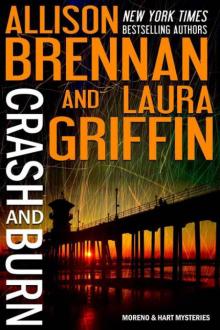 Crash and Burn
Crash and Burn Sudden Death
Sudden Death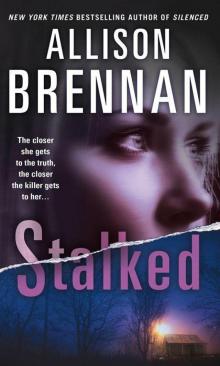 Lucy - 05 - Stalked
Lucy - 05 - Stalked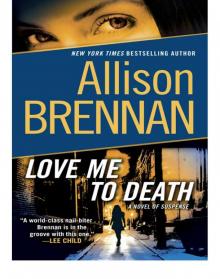 Mortal Sin
Mortal Sin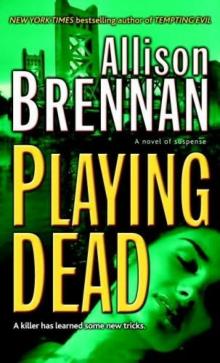 Playing Dead pb-3
Playing Dead pb-3 Kiss Me, Kill Me
Kiss Me, Kill Me Original Sin: The Seven Deadly Sins
Original Sin: The Seven Deadly Sins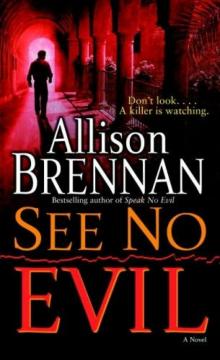 See No Evil e-2
See No Evil e-2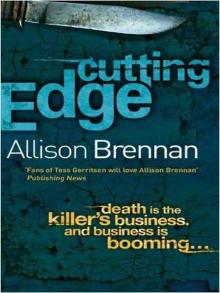 Cutting Edge: A Novel of Suspense
Cutting Edge: A Novel of Suspense Original Sin
Original Sin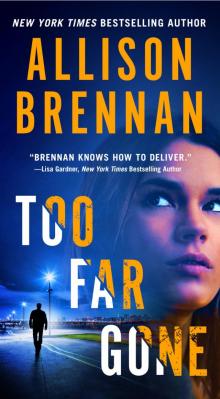 Too Far Gone
Too Far Gone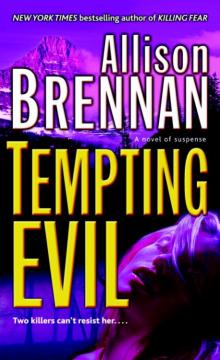 Tempting Evil
Tempting Evil Shattered
Shattered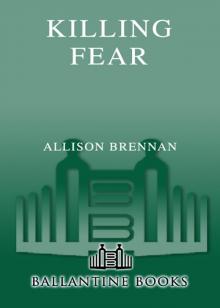 Killing Fear
Killing Fear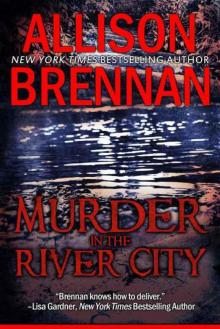 Murder in the River City
Murder in the River City Love Is Murder (lucy kincaid)
Love Is Murder (lucy kincaid)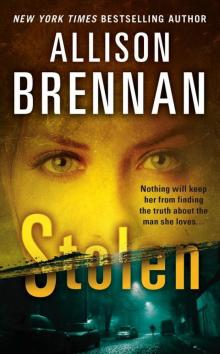 Stolen (Lucy Kincaid Novels)
Stolen (Lucy Kincaid Novels)